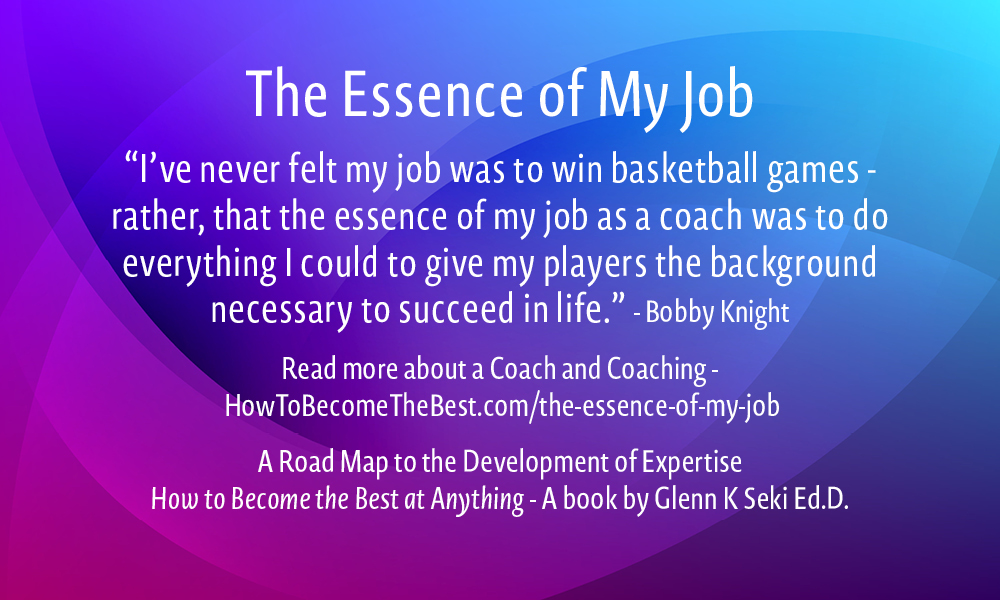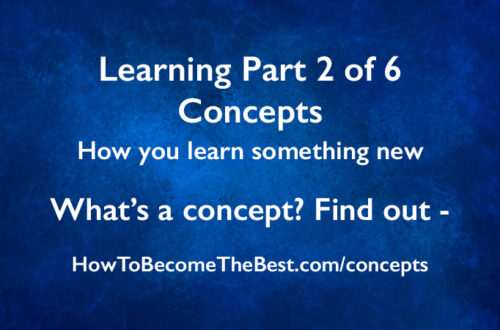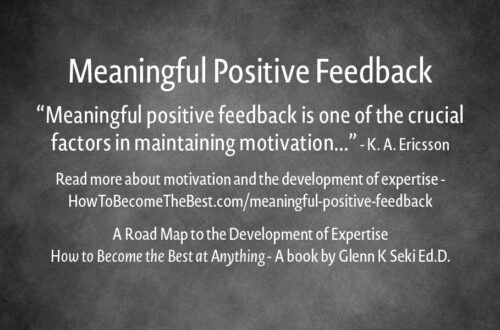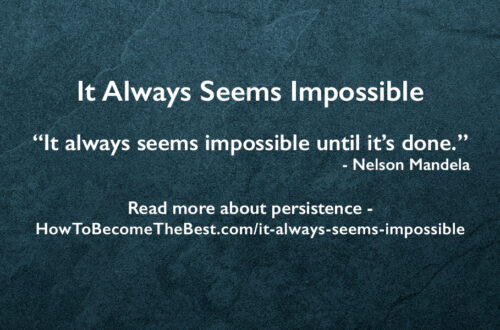“I’ve never felt my job was to win basketball games – rather, that the essence of my job as a coach was to do everything I could to give my players the background necessary to succeed in life.” – Bobby Knight
An excerpt from How To Become The Best at Anything, Chapter 7, A Coach and Coaching
You really need to have a coach/mentor/teacher/etc. A coach can be a parent, relative, friend, teacher, someone you hire, etc. Tiger Wood’s father introduced him to golf, Venus and Serena Williams’ father introduced them to tennis and coached them in their early years. You can have multiple coaches concurrently and consecutively. Your coaches should have a higher expertise level than you do, although they don’t have to. A friend may help motivate you to keep practicing when you want to quit. Your friend may not have any knowledge of the domain in which you are trying to become the best, however, perhaps they know you very well and are able to motivate you to keep going. Your friend would be your motivational coach.
Your coach needs to be able to guide you in deliberate practice and give you instant feedback. This is the best way to practice and the best way to learn. Your practice sessions might not always involve guided practice with instant feedback. This might not always be possible.
You can also use books, magazines, YouTube videos, Websites, etc. to help coach you, however, you need to make sure they contain accurate information. The source of the information should be vetted by an expert in the field. Khan Academy is an example of a Website that is recommended by experts in the field of education.
When I first started photography, there was no World Wide Web. I subscribed to the Time Life photography series. It was a series of books on photography that was delivered on a monthly basis. Each month I would read and reread each book. Then I would practice the techniques presented in the books. I would devise experiments to test a hypothesis involving photographic techniques. I would perform the experiments and test my hypothesis. This was my deliberate practice with feedback. The books became my coach, the results of the experiments were my feedback.
I took several photography classes, attended seminars, and workshops. The instructors of the classes/seminars/workshops were my coaches and they gave feedback after the photography assignments.
When I was in college, I joined the Daily Bruin, the UCLA student newspaper, as a darkroom technician and photographer. This allowed me to have use of the darkroom, film, and photojournalistic assignments. I was also given a stipend, a very small stipend, it was extra money that I used to buy more photographic equipment. So now I had much more access, including a darkroom, film, photo credentials, assignments. I also had several coaches: the photo editor, other staff photographers, news editors, writers, etc. to critique my photographs. The other staff photographers would critique each other’s work on a daily basis. So now I had peer coaches. The Daily Bruin gave me a much-needed boost in access and the availability of numerous coaches.
After my skill level improved, I took part time jobs as a science photographer, traveling portrait photographer, and wedding photographer to further improve my expertise. The supervisors at each of the jobs became my coaches and I was paid a salary. Eventually I became the photo editor of the Daily Bruin and the Southern Campus (the UCLA yearbook).
I carried a camera with me wherever I went and took photos, but not random photos. They were again experiments to perfect a technique. This was deliberate practice, I was practicing to get better. I would practice as much as I could. I would limit myself to one camera and one lens. Sometimes I would pick a theme, like reflections, and just take pictures of reflections. Another time I would practice taking photos without looking through the viewfinder, just pointing. Eventually I could pre-focus the lens, set the exposure, compose the picture, without looking through the viewfinder. I could hold the camera up, press the shutter release, and have a picture that was in focus, properly exposed, and composed correctly.
To view some of my photographs go to my Website – HowToBecomeTheBest.com and click on “Photo Gallery.”
“A coach does not have to be the conventional coach that one thinks about, like an athletic coach, but it would certainly help. It can be any number of other people, books, articles, videos, etc. You can be your own coach, too. When I was my own coach for photography, I would devise an experiment testing a hypothesis, so the results of the experiment were my feedback.
Many of the top USPSA shooters’ first coach was their father. Some fathers are still their adult child’s coach. While not the skills and techniques coach that their roles were in the beginning, they have transitioned into their adult child’s motivational coach.
The best way to practice is with a coach who has you perform deliberate practice with immediate feedback. This is also the fastest way to get better.
Your coach does not need to be the “best in the world” coach, just needs to be the best coach for you. Your needs are unique to you, so the best coach for you will be the one who meets your needs. The coach you start with may or may not be the coach you end up with and you may have multiple coaches at the same time.”





